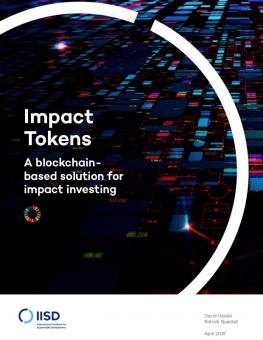
Impact Tokens: A blockchain-based solution for impact investing
Impact tokens and blockchain technology offer promising solutions to mobilizing investments toward the Sustainable Development Goals by addressing the underlying challenges of the impact investing industry.
Key Messages
- Impact investing, which seeks to generate positive, measurable social and environmental impacts alongside a financial return, faces challenges to better address the financing needs of the United Nations Sustainable Development Goals (SDGs).
- Blockchain technology offers solutions that are particularly promising to address the underlying challenges of the impact investing industry by converting non-financial value such as impact into digital tokens that can be tracked.
- Impact tokens describe a group of digital tokens used on a blockchain with the specific goal of unlocking investments for projects with positive social and environmental impacts in support of the SDGs.
The United Nations Sustainable Development Goals (SDGs) invite a range of public and private sector actors to support its agenda of ending poverty, protecting the planet and ensuring that all people enjoy peace and prosperity by 2030. They offer a solid framework for investors and corporations to follow and align their activities and investments accordingly. This has spurred a growth in impact investing, which is an investment approach seeking to generate positive, measurable social and environmental impacts alongside a financial return. However, according to a 2018 survey done by the Global Impact Investing Network (GIIN), the following barriers are still preventing impact investing from scaling up to better address the financing needs of the SDGs:
- Appropriate capital across the risk/return spectrum
- A common understanding of the definition and segmentation of the impact investing market
- Suitable exit options
- Sophistication of impact measurement practice
- High-quality investment opportunities.
Blockchain technology offers new investment and economic opportunities by enabling the transfer of value in a frictionless manner, providing trust as an immutable ledger and converting assets into digital tokens that can be programmed through smart contracts. Blockchain offers solutions that are particularly promising to address the underlying challenges of the impact investing industry. “Impact tokens” describe a group of tokens with the specific goal of unlocking investments for projects with positive social and environmental impacts. A review of over 200 projects that are either active or in development gleaned four key benefits of impact tokens:
- Increasing trust between parties
- Promoting financial and social inclusion
- Improving data collection and accelerating monitoring, reporting and verification processes
- Incentivizing behaviours that promote sustainability.
Most of the reviewed cases focus on digitizing existing marketplaces, reducing transaction costs and creating new platforms for exchanging non-financial value such as impact, natural capital and data. This paper looks at some of the key characteristics of these tokens; how they can be applied in sectors such as agriculture, fisheries, education or energy; how they can provide verified proof of impact for investors; and, ultimately, how they can address each of the five barriers to upscaling impact investing.
Participating experts
You might also be interested in
State of the Sector: Critical energy transition minerals for India
This report presents a comprehensive strategy for securing a reliable supply of critical energy transition materials (CETMs) essential to India's clean energy and low-carbon technology initiatives.
Toward a Coherent, Transformative Approach to Financing Sustainable Development, Climate, and Nature
Four key proposals for the Fourth Financing for Development Conference (FfD4) to create an integrated, equitable approach to financing climate, nature, and development goals.
Green Public Procurement in India
This report analyzes the status of green public procurement (GPP) in India and suggests key strategies for advancing sustainable procurement practices.
Why the Energy Charter Treaty Modernization Doesn't Deliver for Climate
The Energy Charter Conference adopted the "modernized" Energy Charter Treaty (ECT) on December 3, 2024. IISD's Lukas Schaugg explains what the modernization does, when it will enter into force, its tension with EU law, and why the reformed ECT can still hinder climate policies.